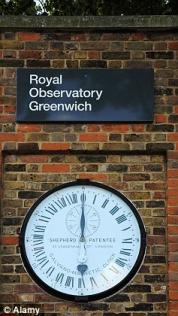- 'Leap seconds' occur when scientists 'add' extra to keep time on Earth in line with solar day and night
- GPS systems at risk of failure due to 'fake' seconds
- Risk of stock market crashes
- Scientists at International Bureau of Weights and Measures call for time standard to be abolished
Coordinated Universal Time is what most of us think of as, simply, 'time'.
It's a standard agreed in the Seventies which is used all around the world - the universal time standard which dictates what time it is in every time zone on earth.
But time might be about to run out for UTC.
Scientists at the International Bureau of Weights and Measures in Paris have called for the ageing standard to be abolished - due to the fact that scientists manually add 'leap seconds' to keep it accurate.
The way we currently do things is not precise enough for the age of electronics, scientists claim.
UTC is 'kept' by averaging the time from 400 atomic clocks on earth - and sometimes differs from the 'real' time dictated by day and night, due to fluctuations in earth's rotation.
The way scientists currently do things is to 'cook the books' by adding 'leap seconds' whenever needed to keep UTC in line with 'real' time, the time dictated by the sun.
So far, this has worked out roughly to one every 'leap second' every year and a half.
But that tiny difference could be disastrous, says 'time director' Felicitas Arias - the head of the International Bureau of Weights and Measures of Paris.
It is vital for global navigation satellite systems such as GPS to have a continuous time scale, not UTC with its leap seconds,' said Arias in an interview with New Scientist.
'That means there is a 15-second difference between UTC and the time GPS uses. Someone who is unaware of this could make a tragic mistake when landing an aircraft, for instance. This could happen.'
And a 1-second difference in the communication between stock exchanges could provoke a gain or loss of millions of dollars.'
The standard is based on atomic clocks - devices which measure time to incredibly precise accuracy by measuring the decay of radioactive particles.But the time the earth takes to spin is changing very slightly.
That has meant that UTC - the time we use everywhere on earth - has slowly ticked away from 'real' astronomical time ever since the standard was introduced.
It's been kept in line by manually adding 'leap seconds'. The world's atomic clocks are held still for one second at midnight, to add a 'leap second' to the day.
This usually happens at midnight in June or December.
At the World Radio Conference of the International Telecommunication Union in Geneva in January 2012, scientists will debate whether to continue adding 'leap seconds' to the standard - or to let earth's time diverge, and thus let our electronics work.
'We are using a system that breaks time,' says Arias. 'The quality of time is continuity. This is why a majority in the international community want to change the definition of UTC and drop the leap second.'
'There is some passionate opposition, especially about the fact that the link between international time and astronomical time will be lost because, little by little, they will diverge. Yet even today we are not living exactly on astronomical time—where noon is when the sun is directly overhead
dailymail.co.uk


